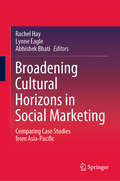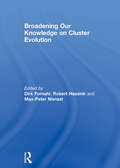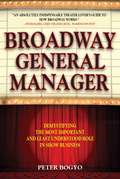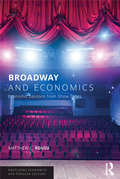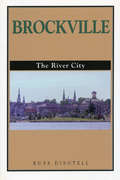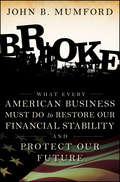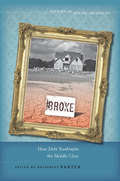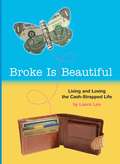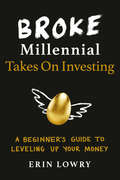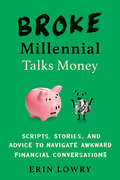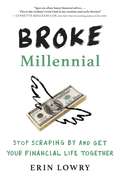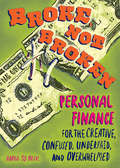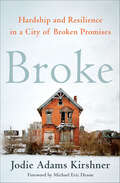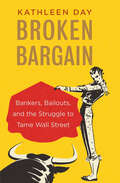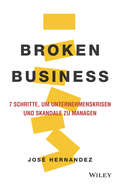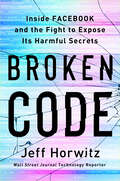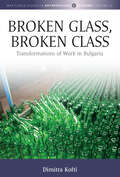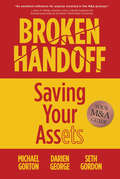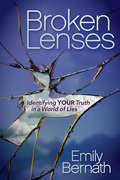- Table View
- List View
Broadcasting in Japan: Case-studies on Broadcasting Systems (Routledge Library Editions: Japan)
by Masami Ito Hiroshi Shiono Toshio Kataoka Seigo NagatakeJapan has developed what is arguably the most sophisticated and the most democratic broadcasting system in the world. The Great Kanto Earthquake of 1st September 1923, with its devastation and confusion drove home in its appalling way the importance of being able to broadcast immediate information to the public. The same year, the Ministry of Communications promptly established an administrative system to regulate broadcasting. In less than a decade over one million people were registered listeners. Under the post war Constitution of 1946 freedom of "speech and all other forms of expression" was guaranteed, and the subsequent Broadcast Law instituted a dual system of broadcasting with the public service Nippon Hoso Kyokai (NHK) on the one hand, and commercial and private broadcasting organizations on the other. In 1978 there were ninety-one television broadcasting organizations and fifty-one radio broadcasting organizations. In this informative study, Professor Ito and his team comprehensively describe the staggering growth of broadcasting in Japan from the dawn or radio and television to satellite communication and through to the multiplex broadcasting of the future.
Broadcasting in Japan: Challenges and Opportunities (Advances in Information and Communication Research #5)
by Hitoshi Mitomo Mikio KimuraThis book provides an analysis of the various challenges and opportunities facing the Japanese broadcasting industry. It is the first book in English that explores how Japanese broadcasting, especially commercial broadcasting, fulfills its social mission under the threat of the increased popularity of Internet-based media services as it reexamines the role and nature of broadcasting. During a series of disasters and the spread of the new coronavirus in Japan, while varied media connected people and supported socio-economic activities, broadcasting continued to be the most trusted. However, as Internet media attract increasing attention, the trend in broadcast viewership is downward. Commercial broadcasting, in particular, will be strongly affected by that trend and the impact of the shrinking population. Recognizing that such dramatic technological and environmental changes are under way, in addition to the eleven researchers participating in the visiting researcher committee at the Research Institute of the Japan Commercial Broadcasters Association (JBA), four research collaborators and the secretariat (director of the JBA) have contributed to this book. They have taken up issues related to challenges and opportunities for the broadcasting industry based on their respective areas of awareness of the problems, including policies for broadcasting, fake news, disaster responses, viewer trust in television programs, competition with Internet-based services, and the business model for broadcasting.
Broaden Your Bandwidth: Knowing Your Strengths and Weaknesses and How They Impact Your Ability to Lead Adaptive Change
by Alexander Grashow Marty Linsky Ronald HeifetzYour bandwidth--your repertoire of techniques for moving adaptive change forward in your organization--is a key element in the complex system that is you, the leader of adaptive change. These techniques span the spectrum from graceful and inspired rhetoric to in-your-face confrontation. Depending on the situation and the people involved, you have to be able to mix and match techniques as needed. This chapter will help you diagnose your current repertoire of skills and broaden your bandwidth. This chapter was originally published as chapter 16 of "The Practice of Adaptive Leadership: Tools and Tactics for Changing Your Organization and the World."
Broadening Cultural Horizons in Social Marketing: Comparing Case Studies from Asia-Pacific
by Lynne Eagle Rachel Hay Abhishek BhatiThis book presents a series of empirically based case studies conducted by social change scholars from Asia-Pacific, showcasing the latest social marketing approaches geared at improving societal well-being in the region. Cutting across cultural perspectives, the contents gather ideas on social marketing campaigns and strategies from around the region and use these case studies as a platform to address concomitant challenges in employing marketing tools to positively change social behaviour. The selection of case studies covers and compares aspects of public health and well-being, and public environmental consciousness in terms of driving attitudes towards implementing improved sustainability in developing and developed countries. Drawing on related policies and legislation, and examining social behaviour at the individual, community, and organisational levels, the authors propose innovative new methods in social marketing and social change research. The book is of interest to researchers and practitioners in social marketing, business ethics, behavioural science, public health, and development studies.
Broadening Our Knowledge on Cluster Evolution
by Dirk Fornahl, Robert Hassink and Max-Peter MenzelAlthough clusters are regarded as important elements in economic development, the strong focus in the literature on the way clusters function is contrasted with a disregard for their evolutionary development: how clusters actually become clusters, how and why they decline, and how they shift into new fields and transform over time. Although recently new cluster life cycle approaches emerged, both empirical evidence and theoretical contributions on this topic are still limited. This book therefore contributes to broadening our knowledge on the life cycle and evolution of clusters both empirically and theoretically. It contains chapters on inter-firm relations as drivers of cluster transformation, as well as chapters on the heterogeneity of firms and firm capabilities during cluster evolution and on the role of institutions in stimulating the emergence and growth of clusters. Case-studies stem from different industries and technologies, such as biogas, film and television, new media and medical technologies, and from different countries, such as Sweden, Austria, Switzerland and South Korea. All chapters underline that cluster evolution does not only depend on internal dynamics, but that external relations are an integral part of cluster dynamics. This book was previously published as a special issue of European Planning Studies.
Broadway Angels (2022)
by Jo Tango Alys FerragamoIn late June of 2022, Sonja Perkins, co-founder of Broadway Angels, contemplated the group's future. She and her co-founders, Jennifer Fonstad, and Magdalena Yesil, started the group to gather together the most successful and powerful women in venture capital and technology with the mission to build a powerful network, showcase top female talent, inspire more women to enter VC and entrepreneurship, and make great investments. Overall, she was pleased with their progress toward their mission but still felt that gender equity in VC was slow to happen. She considered several different ways the group could expand its impact.
Broadway General Manager: Demystifying the Most Important and Least Understood Role in Show Business
by Peter Bogyo“An absolutely indispensable theater lover’s guide to how Broadway works.” —Peter Marks, chief theater critic, Washington Post“Highly recommended for those considering theater as a career and for those who love theater and want to know more about what goes on before the curtain goes up and after.” —Library JournalBroadway General Manager is a fascinating, insightful, and entertaining glimpse into the normally closed world of theatrical general management. Penned by veteran Broadway insider Peter Bogyo, readers will gain an appreciation and understanding of what the business half of show business is all about. For the first time ever, gain backstage access to the fast-paced and glamorous world of Broadway. Broadway General Manager is an invaluable resource that examines actual production and operating budgets for a Broadway show and shares contracts for award-winning actors, directors, and designers, all of which are analyzed extensively. Also included are in-depth discussions on such topics as:How to get started as a general manager Negotiating contracts How the producing entity functions Programming the box office The issues related to hiring employees Binding insurance Financial overview Maintaining the run of a show What to do when sales start to slump Closing a show And much more Laced with humorous insights and personal anecdotes, Broadway General Manager will delight both the average theater lover as well as individuals with a serious interest in commercial arts management.
Broadway and Economics: Economic Lessons from Show Tunes (Routledge Economics and Popular Culture Series)
by Matthew C. RousuEconomics has often been described as "the dismal science," with TV and movies reinforcing this description. However, economics is a powerful tool that can be used to understand how the world works, helping to answer confusing puzzles and solve the world’s problems. Surprisingly, Broadway musicals are an excellent way to show this. Musicals tell engaging stories through song and many are rich with economic concepts. This book analyzes 161 songs from 90 musicals to explore what they can teach us about supply and demand, monetary policy and numerous other core economic concepts. While some songs have an obvious connection to economics, other connections may seem less apparent. When you hear "Let it Go" from Frozen, does your mind think about a firm’s production decisions? After reading this book, it will. Whether showing how Hamilton can illustrate concepts of central banking, or how "Stars" from Les Miserables provides a perfect example of inelastic demand, the author presents complicated topics in an understandable and entertaining way. Featuring classic songs from some of the most popular shows ever produced, along with some hidden gems, Broadway and Economics will be of interest to anybody studying an introductory economics course as well as theatre aficionados.
Brockville: The River City
by Russ DisotellBrockville’s origins reach back to the resettlement of Loyalists following the American Revolution and the threat of American encroachment. Following the War of 1812, Brockville, along the St. Lawrence River, benefitted greatly from the rapidly expanding colonization. A centre for the political activity of the day and a focal point for the Orange movement, Brockville was often immersed in controversy.The end of the 19th century was the golden age of patent medicine business and Brockville was home to two of the most successful, the W. H. Comstock Company and the G. T. Fulford Company. "Pink Pills for Pale People" were sold worldwide. Today, Brockville retains the charm of its heritage mansions and is home to a number of prominent industries.
Broke
by John MumfordWhat principled business leaders can do to solve America's current financial crisisBroke is a startling wake-up call for America and an honest accounting of what our future holds if we don't take charge and change our country for the better. If the business of America is business, then it's up to our business leaders to solve the mess we're in. Broke offers practical, nonpolitical, and nonpartisan solutions that every business leader can implement today for a better tomorrow.Whether you operate a giant corporation or a local small business, you'll find practical steps to limit future risks, strengthen every business, stabilize the current economy, and help turn the country around. Author John Mumford has spent decades helping business leaders turn around failing companies. Now, he helps them to turn around a failing country.Presents bold initiatives and concrete steps every business leader can use to create a better future-for their businesses and for the countryIncludes practical, actionable steps for every business leader who wants to build for the future, while preserving the best of his or her existing enterprise.Shows how business leaders can contribute to the solutions for our problems concerning public debt, the environment, and international relationsOffers a turnaround plan for the country ideal for use by the U.S. Chamber of Commerce, small business organizations, non-profits and others as the centerpiece of a 2010 campaign for America's turnaroundEndorsed by current and former CEO's, top business school leaders, former governors and senators, and leading journalistsDesperate times call for creative, effective measures, not desperation. If you're a business leader, here's how you can do your part.
Broke
by Katherine PorterAbout 1.5 million households filed bankruptcy in the last year, making bankruptcy as common as college graduation and divorce. The recession has pushed more and more families into financial collapse—with unemployment, declines in retirement wealth, and falling house values destabilizing the American middle class. Broke explores the consequences of this unprecedented growth in consumer debt and shows how excessive borrowing undermines the prosperity of middle class America. While the recession that began in mid-2007 has widened the scope of the financial pain caused by overindebtedness, the problem predated that large-scale economic meltdown. And by all indicators, consumer debt will be a defining feature of middle-class families for years to come. The staples of middle-class life—going to college, buying a house, starting a small business—carry with them more financial risk than ever before, requiring more borrowing and new riskier forms of borrowing. This book reveals the people behind the statistics, looking closely at how people get to the point of serious financial distress, the hardships of dealing with overwhelming debt, and the difficulty of righting one's financial life. In telling the stories of financial failures, this book exposes an all-too-real part of middle-class life that is often lost in the success stories that dominate the American economic narrative. Authored by experts in several disciplines, including economics, law, political science, psychology, and sociology, Broke presents analyses from an original, proprietary data set of unprecedented scope and detail, the 2007 Consumer Bankruptcy Project. Topics include class status, home ownership, educational attainment, impacts of self-employment, gender differences, economic security, and the emotional costs of bankruptcy. The book makes judicious use of illustrations to present key findings and concludes with a discussion of the implications of the data for contemporary policy debates.
Broke Is Beautiful: Living and Loving the Cash-Strapped Life
by Laura LeeA Welcome Mat for the Wealthless
Broke Millennial Takes On Investing: A Beginner's Guide to Leveling Up Your Money
by Erin LowryA guide to investing basics by the author of Broke Millennial, for anyone who feels like they aren't ready (or rich enough) to get into the marketMillennials want to learn how to start investing. The problem is that most have no idea where to begin. There's a significant lack of information out there catering to the concerns of new millennial investors, such as: * Should I invest while paying down student loans? * How do I invest in a socially responsible way? * What about robo-advisors and apps--are any of them any good? * Where can I look online for investment advice?In this second book in the Broke Millennial series, Erin Lowry answers those questions and delivers all of the investment basics in one easy-to-digest package. Tackling topics ranging from common terminology to how to handle your anxiety to retirement savings and even how to actually buy and sell a stock, this hands-on guide will help any investment newbie become a confident player in the market on their way to building wealth.
Broke Millennial Talks Money: Scripts, Stories, and Advice to Navigate Awkward Financial Conversations
by Erin LowryA comprehensive guide to talking about money in every aspect of your life, including at work, with friends and family, and in relationships, from the author of the Broke Millennial series.Let's face it--talking about money is always awkward. In this user-friendly and approachable guide, finance writer Erin Lowry helps take the stress out of these tricky conversations. With scripts, tips, and troubleshooting advice, she takes you through every possible money talk scenario, including: • how to tell your friends you can't afford the same lifestyle they can • how to ask your parents if they can afford retirement and if they'll need your support as they age • how to talk to your coworkers about your salary and negotiate with your boss • how to broach the subject of a prenup with your fiancé Lowry arms you with all of the financial knowledge you'll need in order to get the most out of each interaction, whether that's with your friends, your spouse, your employer, or your mom. It's time to demystify our money and hash out these tough topics with the important people in our lives, and this helpful book will make it all much easier.
Broke Millennial: Stop Scraping By and Get Your Financial Life Together
by Erin Lowry<p>Stop Living Paycheck to Paycheck and Get Your Financial Life Together (#GYFLT)! <p>If you’re a cash-strapped 20- or 30-something, it’s easy to get freaked out by finances. But you’re not doomed to spend your life drowning in debt or mystified by money. It’s time to stop scraping by and take control of your money and your life with this savvy and smart guide. <p><i>Broke Millennial</i> shows step-by-step how to go from flat-broke to financial badass. Unlike most personal finance books out there, it doesn’t just cover boring stuff like credit card debt, investing, and dealing with the dreaded “B” word (budgeting). Financial expert Erin Lowry goes beyond the basics to tackle tricky money matters and situations most of us face #IRL, including: <p> <li>Understanding your relationship with moolah: do you treat it like a Tinder date or marriage material? <li>Managing student loans without having a full-on panic attack <li>What to do when you’re out with your crew and can’t afford to split the bill evenly <li>How to get “financially naked” with your partner and find out his or her “number” (debt number, of course) . . . and much more.</li> <p> <p>Packed with refreshingly simple advice and hilarious true stories, <i>Broke Millennial</i> is the essential roadmap every financially clueless millennial needs to become a money master. So what are you waiting for? Let’s #GYFLT!</p>
Broke, Not Broken: Personal Finance for the Creative, Confused, Underpaid, and Overwhelmed
by Anna Jo BeckA compassionate, friendly, and even fun book about personal finance for the overwhelmed. In a world with fewer and fewer economic guarantees, every bit of knowledge is powerful, so we can build the life we dream of, meet our basic needs, and develop a healthy relationship with money. For many of us, salaried work and even hourly wages aren't part of our financial picture; this book is for the self-employed, the entrepreneur, the creative, and the gig worker whose relationship with money isn't well covered by other books. Anna Jo Beck is your calm, friendly, and knowledgable guide through the obstacle course of getting your funds, savings, spending, and debt in order. Hand-illustrated charts and worksheets mean you can start tackling your financial demons, building your safety net, and gaining confidence in your money and value right now.
Broke: Hardship and Resilience in a City of Broken Promises
by Jodie Adams Kirshner"Essential...in showcasing people who are persistent, clever, flawed, loving, struggling and full of contradictions, Broke affirms why it’s worth solving the hardest problems in our most challenging cities in the first place. " —Anna Clark, The New York Times"Through in-depth reporting of structural inequality as it affects real people in Detroit, Jodie Adams Kirshner's Broke examines one side of the economic divide in America" —Salon"What Broke really tells us is how systems of government, law and finance can crush even the hardiest of boot-strap pullers." —Brian Alexander, author of Glass HouseA galvanizing, narrative account of a city’s bankruptcy and its aftermath told through the lives of seven valiantly struggling DetroitersBankruptcy and the austerity it represents have become a common "solution" for struggling American cities. What do the spending cuts and limited resources do to the lives of city residents? In Broke, Jodie Adams Kirshner follows seven Detroiters as they navigate life during and after their city's bankruptcy. Reggie loses his savings trying to make a habitable home for his family. Cindy fights drug use, prostitution, and dumping on her block. Lola commutes two hours a day to her suburban job. For them, financial issues are mired within the larger ramifications of poor urban policies, restorative negligence on the state and federal level and—even before the decision to declare Detroit bankrupt in 2013—the root causes of a city’s fiscal demise. Like Matthew Desmond’s Evicted, Broke looks at what municipal distress means, not just on paper but in practical—and personal—terms. More than 40 percent of Detroit’s 700,000 residents fall below the poverty line. Post-bankruptcy, they struggle with a broken real estate market, school system, and job market—and their lives have not improved. Detroit is emblematic. Kirshner makes a powerful argument that cities—the economic engine of America—are never quite given the aid that they need by either the state or federal government for their residents to survive, not to mention flourish. Success for all America’s citizens depends on equity of opportunity.
Broken Bargain: Bankers, Bailouts, and the Struggle to Tame Wall Street
by Kathleen Day“A sweeping account of financial calamities . . . shows how often we’ve been wracked by crises, and how quickly we forget why, setting up the next one.” —Mark Zandi, Chief Economist, Moody’s AnalyticsIn the 1930s, battered and humbled by the Great Depression, the U.S. financial sector struck a grand bargain with the federal government. Bankers gained a safety net in exchange for certain curbs on their freedom: transparency rules, record-keeping and antifraud measures, and fiduciary responsibilities. Despite subsequent periodic changes in these regulations, the underlying bargain played a major role in preserving the stability of the financial markets as well as the larger economy. By the free-market era of the 1980s and 90s, however, Wall Street argued that rules embodied in New Deal–era regulations to protect consumers, and ultimately taxpayers, were no longer needed—and government agreed.This clear, deeply researched history documents the country’s financial crises, focusing on those of the 1920s, the 1980s, and the 2000s, revealing how the two more recent crises arose from the neglect of this fundamental bargain, and how taxpayers have been left with the bill. “An engaging analysis . . . The section on the S & L crisis is excellent.” —Choice “A fluent if dispiriting study of an economic system that forgives those at the top so long as those at the bottom remain willing to foot the bill.” —Kirkus Reviews
Broken Business: 7 Schritte, um Unternehmenskrisen und Skandale zu managen
by Jose HernandezFacebook, Volkswagen, FIFA, Lehman Bros., Shell, Deutsche Bank, Panama Papers ... Die Nachrichten sind vollgepackt mit Geschichten über Unternehmensskandale, Korruption und Missetaten. Der Bedarf an effektivem Krisenmanagement und Unternehmensführungsstrategien war noch nie so groß wie heute. Warum kommen gute Unternehmen ins Straucheln? Warum passieren Unternehmensskandale so oft? Sind Korruption und Fehlverhalten im Geschäftsleben unvermeidlich? Und was können Unternehmer auf einer pragmatischeren Ebene dagegen tun? Was können sie tun, um ihre Unternehmen bei Skandalen zu retten, oder was können sie tun, um Skandale überhaupt zu vermeiden? Das Buch bietet praxisnahe Anekdoten und Lösungen und beschreibt, wie Unternehmen das Risiko von Skandalen mindern, das Unternehmensimage reformieren und Strukturen installieren können, um ein ethischeres und profitableres Unternehmen zu schaffen. "Broken Business" vertreibt gängige Fehleinschätzungen von unternehmerischem Fehlverhalten und seinen Ursachen durch die faszinierende Erforschung der menschlichen Natur und überzeugendes Storytelling, das grundlegende Fehler in der Unternehmenskultur aufzeigt. Der Autor José Hernandez stützt sich dabei auf seine jahrzehntelange Erfahrung in der Zusammenarbeit mit renommierten globalen Unternehmen, um sieben wesentliche Schritte für die Transformation eines Unternehmens darzustellen, darunter den Aufbau einer besseren Kultur, effektivere Compliance-Systeme und die Neuausrichtung der Strategie.
Broken Code: Inside Facebook and the Fight to Expose Its Harmful Secrets
by Jeff HorwitzBy an award-winning technology reporter for The Wall Street Journal, a behind-the-scenes look at the manipulative tactics Facebook used to grow its business, how it distorted the way we connect online, and the company insiders who found the courage to speak out"Broken Code fillets Facebook&’s strategic failures to address its part in the spread of disinformation, political fracturing and even genocide. The book is stuffed with eye-popping, sometimes Orwellian statistics and anecdotes that could have come only from the inside." —New York Times Book ReviewOnce the unrivaled titan of social media, Facebook held a singular place in culture and politics. Along with its sister platforms Instagram and WhatsApp, it was a daily destination for billions of users around the world. Inside and outside the company, Facebook extolled its products as bringing people closer together and giving them voice.But in the wake of the 2016 election, even some of the company&’s own senior executives came to consider those claims pollyannaish and simplistic. As a succession of scandals rocked Facebook, they—and the world—had to ask whether the company could control, or even understood, its own platforms.Facebook employees set to work in pursuit of answers. They discovered problems that ran far deeper than politics. Facebook was peddling and amplifying anger, looking the other way at human trafficking, enabling drug cartels and authoritarians, allowing VIP users to break the platform&’s supposedly inviolable rules. They even raised concerns about whether the product was safe for teens. Facebook was distorting behavior in ways no one inside or outside the company understood. Enduring personal trauma and professional setbacks, employees successfully identified the root causes of Facebook's viral harms and drew up concrete plans to address them. But the costs of fixing the platform—often measured in tenths of a percent of user engagement—were higher than Facebook's leadership was willing to pay. With their work consistently delayed, watered down, or stifled, those who best understood Facebook&’s damaging effect on users were left with a choice: to keep silent or go against their employer.Broken Code tells the story of these employees and their explosive discoveries. Expanding on &“The Facebook Files,&” his blockbuster, award-winning series for The Wall Street Journal, reporter Jeff Horwitz lays out in sobering detail not just the architecture of Facebook&’s failures, but what the company knew (and often disregarded) about its societal impact. In 2021, the company would rebrand itself Meta, promoting a techno-utopian wonderland. But as Broken Code shows, the problems spawned around the globe by social media can&’t be resolved by strapping on a headset.
Broken Glass, Broken Class: Transformations of Work in Bulgaria (Max Planck Studies in Anthropology and Economy #12)
by Dimitra KoftiBased on a long-term study of the everyday postsocialist politics of labour in the wider context of intense socio-economic transformation in Bulgaria, this book tells the story of the flexibilization of production, the precaritization of work, shifting managerial practices, and ways in which people with different employment statuses live and work together. The ethnography starts with the rapidly moving conveyor belt of a glass factory, where a variety of global and local forces and workers’ divisions meet, and analyses how inequalities are reproduced both at the production site and back home.
Broken Handoff: Saving Your Assets
by Michael Gorton Darien George Seth Gordon“Read this page turner to know what to do and—as importantly—what not to do in M&A. You will be glad you did.” —Mark Victor Hansen, coauthor and co-creator of The One Minute Millionaire and Chicken Soup for the SoulEvery year, more than fifty thousand deserving entrepreneurs and executives attempt to sell a company they’ve worked tirelessly to build—yet more than 70 percent fail. Why? Because most deals are derailed by hidden dangers that leave both buyers and sellers blindsided.Broken Handoff: Saving Your Assets is a breakthrough book with rare and remarkably transparent insights into owning, buying, and selling a business. Exposing unexpected pitfalls and revealing hands-on solutions for the mergers and acquisitions process, Broken Handoff delivers tools to beat the odds and broker the deal you want. This definitive guide to business-ownership transactions is required reading for founders, CEOs, venture capitalists, mentors, and moguls.“Losses from M&A transactions that fall short of expectations represent an opportunity of $3 trillion a year. Broken Handoff clearly addresses the vulnerabilities and shortcomings that cause these failures—and, more importantly, advances viable solutions. This book should be read by everyone anticipating an M&A transaction, funding, or liquidity event.” —James Keyes, former CEO of 7-Eleven and Blockbuster, Horatio Alger recipient“Smashes through the financial and theoretical rhetoric of M&A success and failures. Filled with insights and lessons learned from the school of hard knocks, this book should be required reading for all parties in the M&A dance—especially those seeking to avoid a postmerger cultural collision and declining productivity.” —Michael Schornstein, startup founder, CMO, advisory board member of CommandHound
Broken Lenses: Identifying Your Truth in a World of Lies (Broken Lenses)
by Emily BernathBroken Lenses reveals the truth of who God made people to be and the freedom that results from living out that truth. A rape survivor, Emily Bernath’s life quickly turned away from having everything to feeling hopelessness and worthlessness. It was during that time of being open about her experience that it became apparent to her just how many other people experience those same feelings and so easily allow things that aren’t true about them define who they are. Broken Lenses stems from a passion to take outreach to the next level. Inside, Emily identifies some of the most popular lies people believe about themselves and pulls out the 12 biggest Biblical truths Christians should embrace in their own lives, such as “I am lovable” and “I am not a failure.” With her scientific background and tell-it-how-it-is approach, Emily analyzes and connects each truth to God’s word through a few key lessons for each truth. She calls out the ways in which the enemy prevents people from believing these truths about themselves and what it looks like to truly embrace each of these truths. Ultimately, Broken Lenses helps readers achieve a more intimate relationship with God and the freedom that He desires each of his children to live in.



